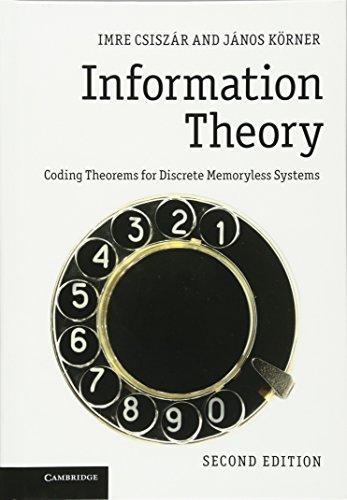

Most ebook files are in PDF format, so you can easily read them using various software such as Foxit Reader or directly on the Google Chrome browser.
Some ebook files are released by publishers in other formats such as .awz, .mobi, .epub, .fb2, etc. You may need to install specific software to read these formats on mobile/PC, such as Calibre.
Please read the tutorial at this link. https://ebooknice.com/page/post?id=faq
We offer FREE conversion to the popular formats you request; however, this may take some time. Therefore, right after payment, please email us, and we will try to provide the service as quickly as possible.
For some exceptional file formats or broken links (if any), please refrain from opening any disputes. Instead, email us first, and we will try to assist within a maximum of 6 hours.
EbookNice Team

Status:
Available4.6
14 reviews
ISBN-10 : 0521196817
ISBN-13 : 9780521196819
Author: Imre Csiszár, János Körner
Csiszár and Körner's book is widely regarded as a classic in the field of information theory, providing deep insights and expert treatment of the key theoretical issues. It includes in-depth coverage of the mathematics of reliable information transmission, both in two-terminal and multi-terminal network scenarios. Updated and considerably expanded, this new edition presents unique discussions of information theoretic secrecy and of zero-error information theory, including the deep connections of the latter with extremal combinatorics. The presentations of all core subjects are self contained, even the advanced topics, which helps readers to understand the important connections between seemingly different problems. Finally, 320 end-of-chapter problems, together with helpful solving hints, allow readers to develop a full command of the mathematical techniques. It is an ideal resource for graduate students and researchers in electrical and electronic engineering, computer science and applied mathematics.
1. Information Measures in Simple Coding Problems
1. Source Coding and Hypothesis Testing. Information Measures
2. Types and Typical Sequences
3. Some Formal Properties of Shannon's Information Measures
4. Non-Block Source Coding
5. Blowing Up Lemma: A Combinatorial Digression
2. Two-Terminal Systems
1. The Noisy Channel Coding Problem
2. Rate-Distortion Trade-Off in Source Coding and the Source-Channel Transmission Problem
3. Computation of Channel Capacity and Δ-Distortion Rates
4. A Covering Lemma. Error Exponent in Source Coding
5. A Packing Lemma. On the Error Exponent in Channel Coding
6. Arbitrarily Varying Channels3. Multi-Terminal Systems
1. Separate Coding of Correlated Source
2. Multiple-Access Channels
3. Entropy and Image Size Characterization
4. Source and Channel NetworksReferencesName IndexSubject IndexIndex of Symbols and Abbreviations
is discrete math useful for programming
what is discrete memoryless source
discrete mathematical structures for computer science
is discrete math necessary for programming
do you need discrete math for programming
Tags: Information, Theory, Coding Theorems, Discrete Memoryless Systems, Imre Csiszár, János Körner